Finding out what ethical and moral decisions trouble high school students year after year is a unique undertaking at the Shelton School’s Ethics Symposium. The 19th annual symposium, recently hosted at UT Dallas by the Naveen Jindal School of Management, took sophomores and juniors from Shelton and other North Texas schools far beyond themselves, deep into adult decision-making territory.
Questions they considered included: What responsibility do we have to help a paroled murderer re-start his life? And how will we answer if the murderer is staring us in the eye?
Those were not just hypotheticals. The more than 100 high school students in attendance listened in rapt silence as Prison Entrepreneurship Program (PEP) CEO Bryan Kelley spoke about how he got addicted to cocaine, ended up in a barroom brawl that resulted in a man’s death and was sentenced to life in prison.
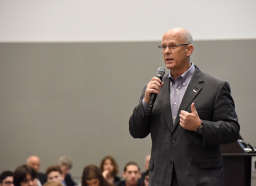
Kelley’s road to redemption began after a prison-yard riot, as he sat handcuffed in the grass for three hours, covered in fire ants.
“I decided then I was tired of being part of the problem. I wanted to be part of the solution, but like most people in prison, I didn’t know how,” he said during his keynote address Feb. 6 at the Davidson-Gundy Alumni Center.
Gradually, he figured out a way. Kelley enrolled in the PEP program at the Cleveland Unit prison in East Texas and earned a psychology degree while still behind bars. Paroled for good behavior after 21 years, he joined the PEP staff in 2014 and counseled fellow convicts, including some who committed murder after being bullied or as payback to a child molester.
“There are a lot of gray areas out there,” Kelley said. “We are all deserving of a second, third or fourth chance.”
The key, he told students, was to think about ethics every chance you get: “You just can’t make decisions on a whim.”
Dr. Diane McNulty, JSOM’s associate dean for external affairs and corporate development, and JSOM Executive Education Clinical Professor Gerald (Jerry) Hoag were responsible for bringing the Shelton program to campus.
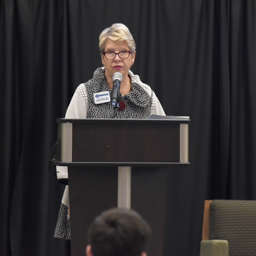
“Shelton approached UT Dallas and the Jindal School about partnering with us, as we are nearby educational neighbors, and we knew JSOM had an ethics curriculum,” Anne Hendrick-Thomas, Shelton’s director of public relations and marketing, said.
McNulty said that at the 2019 symposium, Kelley excelled at showing students how prisoners feel remorse and how they struggle to adapt to society after leaving jail.
“His presentation was stunning in that he clearly addressed walking the fine line between what is legal, ethical and moral, and the personal grief that offenders pay for a moment of bad judgment,” she said. “I believe attendees felt his grief and his dedication through the PEP to improving the future for released felons.”
McNulty said UT Dallas hosted the symposium as part of its ongoing effort to broaden students’ perspectives on ways to improve society. Starting last fall, Jindal School undergraduate students are now required to complete 100 hours of community service in order to graduate.
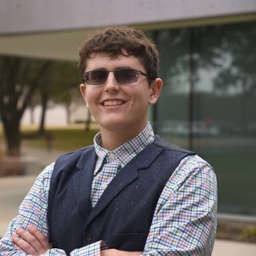
Sean Heffernan, a student at the Dallas-based Shelton School, gave Kelley’s speech a rave review.
“It was fascinating to see how a man can grapple with the consequences of making a bad decision and decide to turn a really bad situation into a really positive one,” Heffernan said.
“Yes, we need to protect people from crime. But we also need to treat people in prison with compassion and help them better themselves. Otherwise, they’ll head right back to prison, over and over, until it becomes a brutal cycle.”

Shelton student Mark Williams said Kelley offered a much-needed lesson in rejecting preconceived notions.
“It was a big shock to me to find out that the murderer he was talking about was really himself,” Williams said. “You have to look at everyone’s perspective: People do change.”
The symposium drew students from Shelton and other schools in North Texas for a day of wide-ranging discussion.
When Shelton ethics instructor Wil Matthews challenged the audience to come up with a good description for America’s current ethical climate, one student yelled “a state of confusion!”
Matthews replied that ethical clarity is actually an individual responsibility. “There is no ethics police,” he said. “It’s up to you. We all have a chance to make a change.”
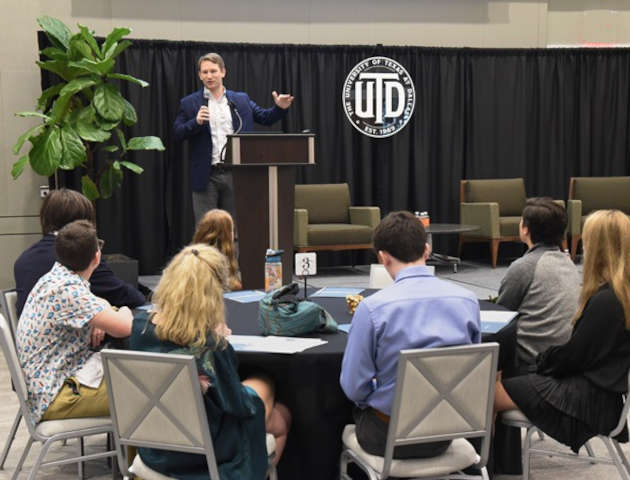
Speakers came from fields as diverse as technology, medicine, religion and the military. Clint Bruce, a former Navy SEAL, spoke of the complicated ethics of working in a war zone. “Ethics exposes you to enormous risks. Even if you make the right call, it can still cost men’s lives,” he said.
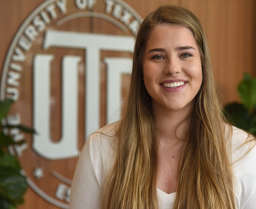
While the stakes are not usually quite so high for students, their decision-making process can be just as challenging, Bruce said. “The hardest thing is making an unpopular decision, holding your ground and knowing in your soul that you’re right.”
Shelton student Abbey Euting agreed. She said the symposium served as a reminder to ignore peer pressure and follow your gut.
“You might be at home on a Friday night while everybody’s going to parties and drinking, and it’s on their social media. … It seems like the cool thing to do, but it’s not the right thing, so which do I do?” she said.
The answer, she said, is to “know your moral compass. You’ve got to know yourself, know what you believe in and stick to it, as hard as that can be.”






